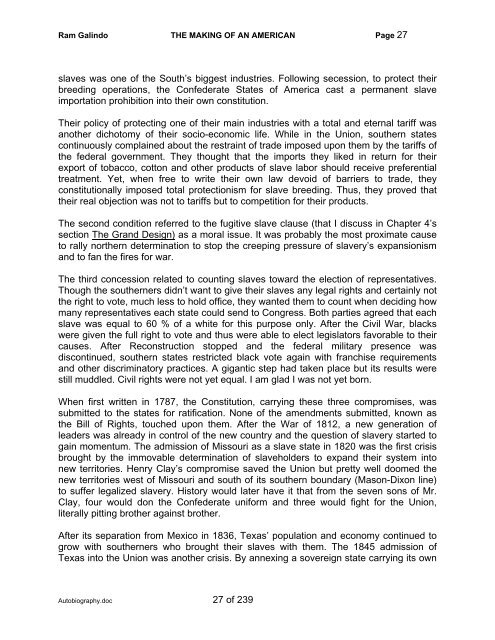Autobiography - The Galindo Group
Autobiography - The Galindo Group
Autobiography - The Galindo Group
Create successful ePaper yourself
Turn your PDF publications into a flip-book with our unique Google optimized e-Paper software.
Ram <strong>Galindo</strong> THE MAKING OF AN AMERICAN Page 27<br />
slaves was one of the South’s biggest industries. Following secession, to protect their<br />
breeding operations, the Confederate States of America cast a permanent slave<br />
importation prohibition into their own constitution.<br />
<strong>The</strong>ir policy of protecting one of their main industries with a total and eternal tariff was<br />
another dichotomy of their socio-economic life. While in the Union, southern states<br />
continuously complained about the restraint of trade imposed upon them by the tariffs of<br />
the federal government. <strong>The</strong>y thought that the imports they liked in return for their<br />
export of tobacco, cotton and other products of slave labor should receive preferential<br />
treatment. Yet, when free to write their own law devoid of barriers to trade, they<br />
constitutionally imposed total protectionism for slave breeding. Thus, they proved that<br />
their real objection was not to tariffs but to competition for their products.<br />
<strong>The</strong> second condition referred to the fugitive slave clause (that I discuss in Chapter 4’s<br />
section <strong>The</strong> Grand Design) as a moral issue. It was probably the most proximate cause<br />
to rally northern determination to stop the creeping pressure of slavery’s expansionism<br />
and to fan the fires for war.<br />
<strong>The</strong> third concession related to counting slaves toward the election of representatives.<br />
Though the southerners didn’t want to give their slaves any legal rights and certainly not<br />
the right to vote, much less to hold office, they wanted them to count when deciding how<br />
many representatives each state could send to Congress. Both parties agreed that each<br />
slave was equal to 60 % of a white for this purpose only. After the Civil War, blacks<br />
were given the full right to vote and thus were able to elect legislators favorable to their<br />
causes. After Reconstruction stopped and the federal military presence was<br />
discontinued, southern states restricted black vote again with franchise requirements<br />
and other discriminatory practices. A gigantic step had taken place but its results were<br />
still muddled. Civil rights were not yet equal. I am glad I was not yet born.<br />
When first written in 1787, the Constitution, carrying these three compromises, was<br />
submitted to the states for ratification. None of the amendments submitted, known as<br />
the Bill of Rights, touched upon them. After the War of 1812, a new generation of<br />
leaders was already in control of the new country and the question of slavery started to<br />
gain momentum. <strong>The</strong> admission of Missouri as a slave state in 1820 was the first crisis<br />
brought by the immovable determination of slaveholders to expand their system into<br />
new territories. Henry Clay’s compromise saved the Union but pretty well doomed the<br />
new territories west of Missouri and south of its southern boundary (Mason-Dixon line)<br />
to suffer legalized slavery. History would later have it that from the seven sons of Mr.<br />
Clay, four would don the Confederate uniform and three would fight for the Union,<br />
literally pitting brother against brother.<br />
After its separation from Mexico in 1836, Texas’ population and economy continued to<br />
grow with southerners who brought their slaves with them. <strong>The</strong> 1845 admission of<br />
Texas into the Union was another crisis. By annexing a sovereign state carrying its own<br />
<strong>Autobiography</strong>.doc 27 of 239


